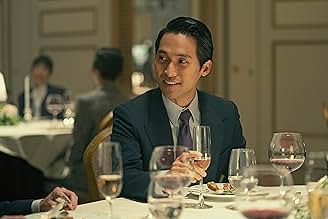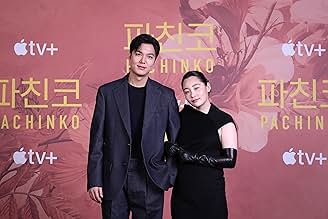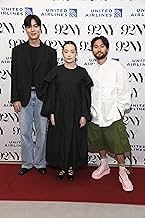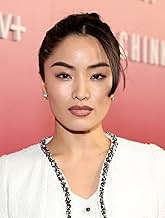Based on the New York Times bestseller, this sweeping saga chronicles the hopes and dreams of a Korean immigrant family across four generations as they leave their homeland in an indomitable... Read allBased on the New York Times bestseller, this sweeping saga chronicles the hopes and dreams of a Korean immigrant family across four generations as they leave their homeland in an indomitable quest to survive and thrive.Based on the New York Times bestseller, this sweeping saga chronicles the hopes and dreams of a Korean immigrant family across four generations as they leave their homeland in an indomitable quest to survive and thrive.
- Nominated for 1 Primetime Emmy
- 15 wins & 30 nominations total
Browse episodes
Featured reviews
After watching the three episodes, I may deeply realize the artistic attainments of the director. The composition is beautiful, the picture is magnificent, and every frame is eye-catching. I can see that every actor has made a lot of efforts to shape the character. I believe that everyone who has experienced immigration can find resonance in it. Will continue to follow up on new episodes.
If you've watched enough Korean dramas, you'd know that the story elements are not new revelations. They're an amalgamation of the history of Korea, and well-worn themes and stories of real lives of Koreans who've suffered at the hands of the Japanese, and the clash of cultures, attitudes, bigotry, hatred and cruelty, across Korean, Japanese and westerners. It's easy to forget that this was less than a hundred years ago, and spanning only a few decades; and so often, the bitterness still felt by Koreans leads to a heavy handed portrayal of the Japanese and westerners. It's a fine line to walk to be able tell a story about generations of a family and their personal struggles without getting lost in that bitterness.
It's so amazing so far to see how beautifully the show tells the stories across multiple timelines, with incredible actors, excellent cinematography and direction. The contrast is striking, from the primitive Korean fishing village to the urban sprawl. While the show's synopsis is about their "indomitable quest to survive and thrive", it's the story of Korea and its people as whole being told through these four generations of characters.
It's so amazing so far to see how beautifully the show tells the stories across multiple timelines, with incredible actors, excellent cinematography and direction. The contrast is striking, from the primitive Korean fishing village to the urban sprawl. While the show's synopsis is about their "indomitable quest to survive and thrive", it's the story of Korea and its people as whole being told through these four generations of characters.
Pachinko avoids the cliches of the K-drama, instead settles for an European soap drama style with plenty of depth, chronicling the plight of a Korean family under the Japanese occupation and juxtaposing that with life in 1989, all in brilliant cinematic storytelling.
This series does not shy away from the effects of Japan's forced occupation on Korea. It plays out with an emotional impact from the viewpoint of Sunja's life via the unique structure in blending timelines. From Sunja's youth under Japan's stranglehold to that of her grandson in 1989. It depicts the various stages of Japan's influences on Sunja's family life, from war torn times to the might of the financial impact that Japan displayed during the 80's.
It is an engrossing drama that reveals the horrors of life under a brutal occupation, and the long term effects it has on generational lives. All through the eyes of a strong protagonist, Sunja, played brilliantly by the various actors.
This series does not shy away from the effects of Japan's forced occupation on Korea. It plays out with an emotional impact from the viewpoint of Sunja's life via the unique structure in blending timelines. From Sunja's youth under Japan's stranglehold to that of her grandson in 1989. It depicts the various stages of Japan's influences on Sunja's family life, from war torn times to the might of the financial impact that Japan displayed during the 80's.
It is an engrossing drama that reveals the horrors of life under a brutal occupation, and the long term effects it has on generational lives. All through the eyes of a strong protagonist, Sunja, played brilliantly by the various actors.
Wow! What a truly mind-blowing rendition of one of the most moving novels in recent history. The casting, direction, acting and cinematography are all equally exceptional.
Great cinematography, indeed- also costumes, locations, etc- technically all perfect, and very good casting. The script does not follow the book, which changes the view on characters, giving them different vibe - and also the jumping timelineis done so often and sometimes in the middle of the scene, that it does not allow the build-up of atmosphere, is pushing so many characters at the same time and prevents the viewer to really get to know them. I believe a linear story line would have been more beneficial by allowing viewers to connect to the characters, immerse in the story and also illuminate the attitude of the next generation. It seems a bit rushed and does not really gives that feeling of the family saga. Special Kudos for Kim Minha, who nailed her first leading role, and excellent performance from Lee Min Ho was perfect in Hansu. They succeeded also in expressing the relation between their characters, which is not described even in the book as love, but as passion between a 40 years old man in a loveless marriage and an innocent teenager. Looking forward to see the next episodes !
Did you know
- Crazy creditsThe opening titles are a montage of Sunja and her family dancing in a pachinko parlor, interspersed with footage of Korean immigrants across various decades.
- ConnectionsFeatured in WatchMojo: Top 10 Best TV Shows of 2022 (2022)
- How many seasons does Pachinko have?Powered by Alexa
Details
- Runtime55 minutes
- Color
- Sound mix
- Aspect ratio
- 2.20 : 1
Contribute to this page
Suggest an edit or add missing content









































